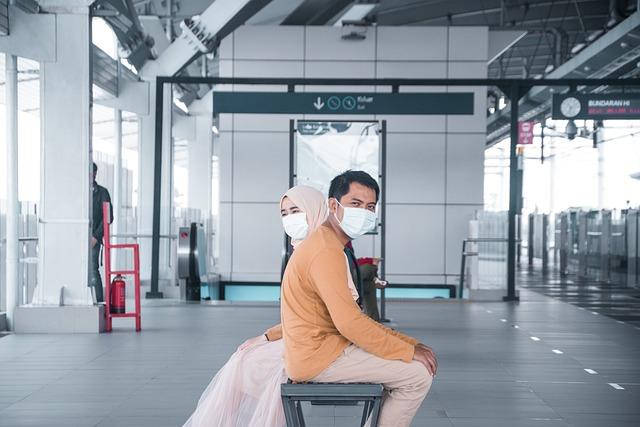As the world marks another year since the emergence of Covid-19, Japan finds itself at a critical crossroads in its public health response. Despite notable progress in vaccination efforts and a generally stable case count, many healthcare professionals express deep concern over a pervasive sense of complacency that appears to have taken hold among the general populace. This sentiment is underscored by the growing challenge of addressing emerging variants and the need for continued vigilance as winter approaches. In this article, we delve into the perspectives of Japanese doctors who are sounding the alarm, urging both the government and citizens to remain proactive in safeguarding public health as the pandemic’s legacy continues to unfold. Amidst a backdrop of shifting societal attitudes, the stakes remain high, with the potential for future outbreaks posing a sobering reminder of the lessons learned from the past three years.
Concerns Over Public Complacency as Covid-19 Anniversary Approaches

As the anniversary of Covid-19 approaches, health experts in Japan are raising alarms about a growing sense of complacency among the public.After more then three years of navigating the pandemic, the fatigue associated with ongoing measures and safety protocols seems to have dulled the once-vigilant attitude of many individuals and communities. Doctors are notably concerned that the waning public urgency could lead to a resurgence of cases, putting both vulnerable populations and the healthcare system at risk.
Key factors contributing to this complacency include:
- Reduced media coverage: As news cycles shift, the urgency surrounding Covid-19 has faded, leaving many feeling that the situation has improved considerably.
- Vaccine complacency: With a majority of the population vaccinated, some individuals believe that the threat is minimal, underestimating the dangers of variants.
- Social fatigue: Extended periods of social distancing and restrictions have led to a yearning for normalcy, causing people to prioritize personal freedoms over caution.
Data from recent surveys reveals a troubling trend: many citizens are neglecting basic safety practices such as mask-wearing and social distancing in crowded places. In a recent study, the response to safety compliance was stark:
| Behaviour | Percentage of Population Adhering |
|---|---|
| Wearing masks indoors | 43% |
| Maintaining social distance | 36% |
| Regular hand sanitization | 50% |
Medical professionals emphasize the importance of reinstating awareness campaigns and encouraging continued vigilance. Experts argue that the pandemic may not be over, and that ongoing education about preventive measures is essential to protect against potential future outbreaks.Only through a renewed commitment to health practices can communities hope to safeguard their wellbeing as they commemorate the challenges faced over the past three years.
health Experts Urge Vigilance Amid Declining Awareness of Pandemic Risks

As the anniversary of Covid-19 looms,Japanese health experts are expressing concern over a growing sense of complacency among the public regarding pandemic risks.Despite the significant strides made in vaccination and treatment, there is a palpable decline in awareness about the virus and its potential repercussions. Experts emphasize the importance of remaining vigilant, particularly as new variants continue to emerge.
Key factors contributing to this complacency include:
- Decreased Media Coverage: With the focus shifting to other news, less information about Covid-19 is circulating.
- Vaccination Fatigue: Many individuals feel secure after receiving their vaccines, leading to a reduction in protective behaviors.
- Social Pressures: The desire to return to normal can overshadow cautious practices.
To combat these trends, health officials are calling for renewed public health campaigns aimed at educating citizens about ongoing risks. They advocate for:
- Regular updates: Keeping the public informed about the evolving situation through transparent communication.
- Community Engagement: Encouraging participation in safety practices such as mask-wearing and social distancing.
- Health Check-ups: Promoting routine health evaluations as variants could affect individuals differently.
Considering these challenges, a recent survey revealed shifts in public perception of pandemic risks, as shown in the table below:
| Year | Percentage of People Concerned about Covid-19 |
|---|---|
| 2020 | 85% |
| 2021 | 70% |
| 2022 | 50% |
| 2023 | 30% |
The data reflects a concerning trend that underscores the need for ongoing public awareness initiatives. As Japan navigates this critical juncture, collaboration between healthcare providers and the community will be essential to maintain resilience against Covid-19 and its potential impacts.
Addressing the Mental Health Impact of Prolonged Crisis on Healthcare Workers

The protracted crisis brought on by the pandemic has dramatically affected healthcare workers, stretching their physical and mental resources to the brink. As hospitals filled to capacity and staff members faced unprecedented patient loads, the ongoing stress has taken a toll on the emotional well-being of these essential workers. Proactive measures are crucial to mitigate the psychological fallout that many are now experiencing, with a focus on both organizational support and individual resilience.
Healthcare institutions must take responsibility for creating a supportive surroundings that prioritizes mental health. This can include:
- Access to Counseling Services: Providing healthcare workers with immediate access to mental health professionals.
- Regular Mental Health Check-ins: Implementing routine assessments to gauge staff well-being and address concerns early.
- Work-Life Balance Initiatives: Encouraging schedules that allow for rest and recovery, preventing burnout.
- Peer Support Programs: Creating safe spaces for healthcare workers to share experiences and strategies to cope.
Moreover, fostering a culture that normalizes conversations around mental health can dismantle the stigma frequently enough associated with seeking help in the medical field. peer support systems, in particular, can empower workers to share their challenges openly, cultivating a sense of community and shared purpose. By prioritizing these measures, hospitals not only enhance their capability to manage current crises but also fortify their workforce against future waves of trauma.
To illustrate the pressing need for supportive structures, the following table summarizes key mental health challenges faced by healthcare workers along with possible interventions:
| Mental Health Challenge | Intervention |
|---|---|
| Burnout | Implement mandatory rest periods |
| Anxiety | Onsite stress management workshops |
| Isolation | Peer mentoring programs |
| Depression | Access to therapy and support groups |
Strategies for Renewed Public Engagement and Strengthening Health Protocols

As the world reflects on the anniversary of Covid-19, health authorities in japan are urging a reinvigoration of public engagement strategies to address potential complacency. Educational campaigns aimed at raising awareness about ongoing risks and preventative measures can play a crucial role. These might include:
- Community workshops to inform citizens about the benefits of vaccination and ongoing health protocols.
- Utilizing social media platforms for regular updates and engaging content that resonates with younger demographics.
- Collaboration with local influencers and health ambassadors to promote messages more effectively.
In addition to enhancing public engagement, strengthening health protocols is imperative. There’s a pressing need to adapt existing measures based on current data and feedback from healthcare professionals. This could involve:
- Conducting regular assessments of health infrastructure to ensure preparedness for future outbreaks.
- Implementing robust contact tracing systems to swiftly address potential clusters.
- Enhancing the accessibility of health services, especially in rural areas, to prevent unequal resource distribution.
Furthermore, fostering collaboration between governmental agencies, private sectors, and civil society organizations creates a thorough approach for public health strategy development. It is important to establish an annual health awareness summit, fostering discussions about epidemiological trends and preventive health strategies.
Below is a simple overview of potential strategy milestones:
| Strategy | Objective | Timeline |
|---|---|---|
| Community Workshops | Increase vaccination awareness | Quarterly |
| Social Media Campaigns | Engage younger demographics | Monthly |
| Health Infrastructure Assessments | ensure readiness for outbreaks | Bi-annual |
Key Takeaways
As the anniversary of the Covid-19 pandemic approaches, Japan stands at a pivotal crossroads. The reflections of healthcare professionals highlight a growing concern about complacency that could undermine the hard-won gains made in public health and safety. While the country has made significant strides in managing the virus, the lingering threat of variants, combined with a potential decline in vigilance, underscores the need for continued awareness and proactive measures.
As we look to the future, it is indeed essential that both the government and the public remain committed to safeguarding health and preventing another wave of infection.With the lessons learned from the past and a renewed focus on vigilance, Japan can navigate the ongoing challenges of this pandemic and emerge stronger. The voices of its medical community serve as a crucial reminder that the fight against Covid-19 is not yet over, and sustained efforts are necessary to protect the population as the world evolves from crisis into recovery.


